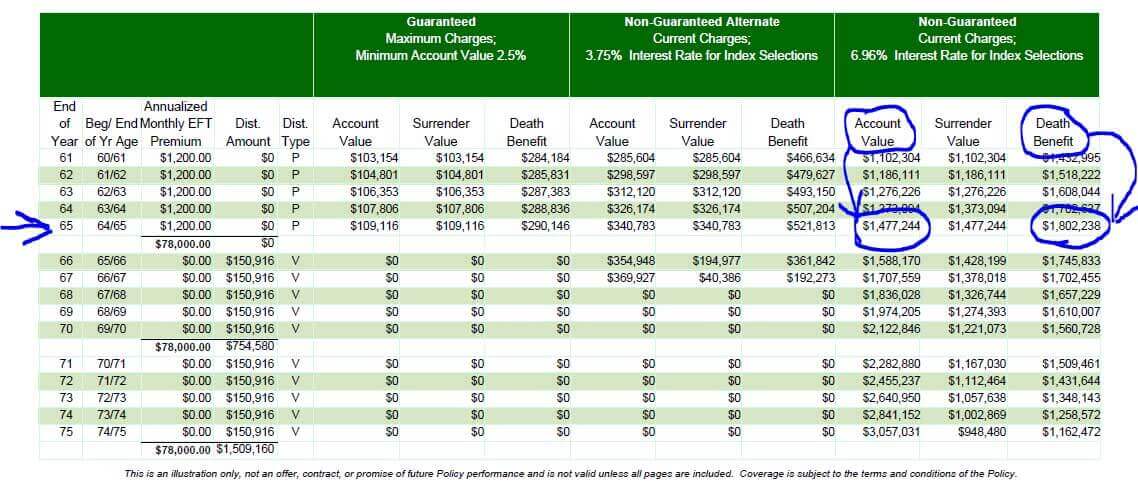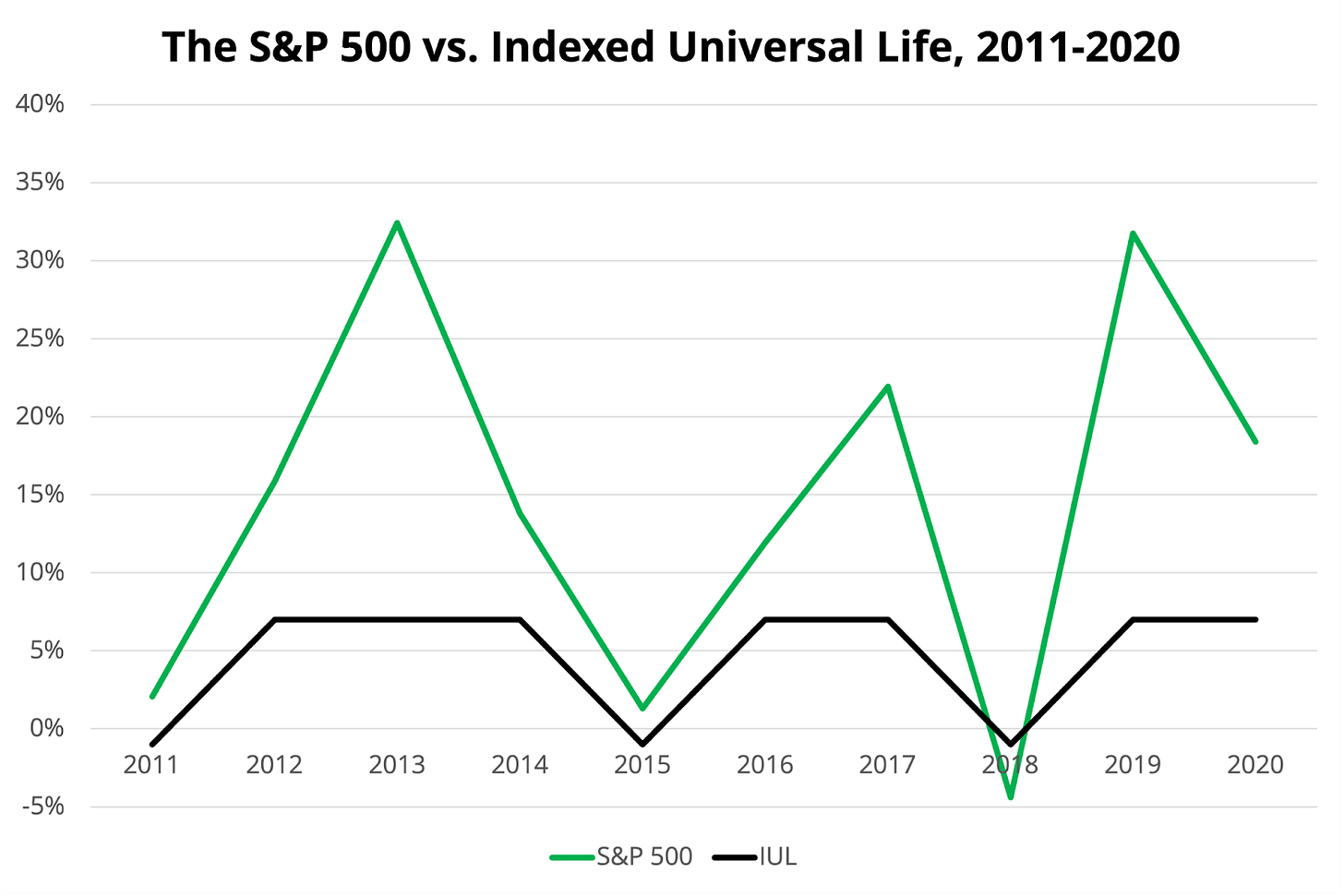All Categories
Featured
Table of Contents
1), often in an effort to defeat their classification averages. This is a straw man disagreement, and one IUL people enjoy to make. Do they contrast the IUL to something like the Vanguard Total Stock Exchange Fund Admiral Show to no tons, a cost ratio (EMERGENCY ROOM) of 5 basis points, a turnover proportion of 4.3%, and an exceptional tax-efficient record of circulations? No, they compare it to some awful proactively taken care of fund with an 8% tons, a 2% ER, an 80% turn over ratio, and a terrible record of short-term capital gain distributions.
Mutual funds typically make yearly taxed circulations to fund owners, also when the worth of their fund has actually gone down in worth. Mutual funds not just call for income reporting (and the resulting annual taxes) when the shared fund is going up in worth, yet can likewise impose earnings tax obligations in a year when the fund has dropped in worth.
You can tax-manage the fund, collecting losses and gains in order to minimize taxable circulations to the capitalists, but that isn't in some way going to alter the reported return of the fund. The ownership of common funds may need the mutual fund owner to pay approximated tax obligations (universal reinsurance system).

IULs are simple to place to make sure that, at the proprietor's fatality, the recipient is not subject to either revenue or estate taxes. The exact same tax obligation decrease strategies do not function nearly too with shared funds. There are countless, commonly pricey, tax obligation traps connected with the timed buying and selling of common fund shares, catches that do not use to indexed life insurance policy.
Chances aren't extremely high that you're mosting likely to undergo the AMT because of your common fund distributions if you aren't without them. The remainder of this one is half-truths at finest. For example, while it is real that there is no earnings tax obligation due to your successors when they inherit the profits of your IUL plan, it is likewise real that there is no earnings tax obligation due to your heirs when they inherit a shared fund in a taxed account from you.
Benefits Of Iul
The government inheritance tax exemption limitation is over $10 Million for a pair, and expanding annually with rising cost of living. It's a non-issue for the huge majority of doctors, a lot less the remainder of America. There are far better ways to avoid estate tax concerns than purchasing financial investments with reduced returns. Shared funds may cause earnings tax of Social Safety advantages.
:max_bytes(150000):strip_icc()/Pros-and-cons-indexed-universal-life-insurance_final-1b83c0fd52154eb69edd47f99ab8927a.png)
The growth within the IUL is tax-deferred and may be taken as free of tax earnings via finances. The policy proprietor (vs. the shared fund manager) is in control of his/her reportable earnings, therefore allowing them to decrease or also get rid of the taxation of their Social Safety and security benefits. This is wonderful.
Right here's another very little concern. It holds true if you purchase a common fund for state $10 per share right before the distribution day, and it disperses a $0.50 distribution, you are after that mosting likely to owe taxes (possibly 7-10 cents per share) regardless of the fact that you have not yet had any gains.
In the end, it's actually about the after-tax return, not just how much you pay in taxes. You're also possibly going to have more money after paying those tax obligations. The record-keeping needs for owning common funds are dramatically a lot more complex.
With an IUL, one's records are kept by the insurance coverage firm, duplicates of annual statements are mailed to the proprietor, and distributions (if any) are amounted to and reported at year end. This is also sort of silly. Certainly you should maintain your tax obligation documents in situation of an audit.
Iul As A Retirement Vehicle
Barely a factor to acquire life insurance policy. Common funds are typically component of a decedent's probated estate.
Additionally, they undergo the delays and expenses of probate. The earnings of the IUL policy, on the other hand, is constantly a non-probate circulation that passes beyond probate directly to one's named recipients, and is as a result exempt to one's posthumous financial institutions, undesirable public disclosure, or similar delays and costs.
We covered this one under # 7, however just to recap, if you have a taxed common fund account, you must place it in a revocable trust fund (or perhaps less complicated, utilize the Transfer on Death classification) in order to prevent probate. Medicaid incompetency and life time income. An IUL can give their owners with a stream of income for their entire lifetime, despite how much time they live.

This is beneficial when organizing one's affairs, and transforming assets to revenue before a retirement home confinement. Mutual funds can not be converted in a comparable fashion, and are usually taken into consideration countable Medicaid properties. This is one more stupid one advocating that bad people (you recognize, the ones who require Medicaid, a federal government program for the inadequate, to pay for their retirement home) must utilize IUL rather than shared funds.
Declared Rate Universal Life Insurance
And life insurance policy looks dreadful when compared relatively versus a retired life account. Second, individuals that have cash to acquire IUL over and beyond their pension are going to have to be dreadful at handling cash in order to ever before receive Medicaid to pay for their retirement home costs.
Chronic and incurable health problem biker. All plans will certainly allow a proprietor's easy accessibility to cash from their plan, frequently waiving any kind of abandonment fines when such people endure a severe disease, need at-home treatment, or become restricted to an assisted living facility. Common funds do not give a similar waiver when contingent deferred sales fees still put on a shared fund account whose owner needs to offer some shares to fund the costs of such a keep.
Indexed Universal Life Insurance Calculator
You obtain to pay more for that advantage (biker) with an insurance coverage policy. What an excellent bargain! Indexed universal life insurance coverage offers fatality benefits to the recipients of the IUL owners, and neither the proprietor nor the beneficiary can ever shed cash because of a down market. Mutual funds supply no such guarantees or death advantages of any kind of kind.
Currently, ask yourself, do you really need or desire a death advantage? I definitely do not require one after I get to financial independence. Do I want one? I suppose if it were inexpensive sufficient. Naturally, it isn't affordable. On average, a buyer of life insurance policy spends for real cost of the life insurance policy benefit, plus the costs of the policy, plus the revenues of the insurance coverage company.
Equity Index Life Insurance
I'm not totally sure why Mr. Morais threw in the entire "you can't lose money" again below as it was covered rather well in # 1. He simply intended to duplicate the ideal selling point for these points I intend. Again, you don't lose nominal bucks, however you can shed real bucks, as well as face major chance cost because of reduced returns.

An indexed global life insurance plan proprietor may trade their plan for a totally various plan without activating income taxes. A mutual fund proprietor can stagnate funds from one mutual fund business to another without marketing his shares at the previous (therefore triggering a taxed event), and buying new shares at the last, often subject to sales charges at both.
While it holds true that you can exchange one insurance coverage policy for another, the factor that individuals do this is that the very first one is such a terrible policy that also after acquiring a brand-new one and experiencing the early, unfavorable return years, you'll still come out ahead. If they were offered the appropriate policy the very first time, they shouldn't have any type of need to ever exchange it and experience the early, adverse return years once more.
Latest Posts
Disadvantage Insurance Life Universal
Index Life Insurance Companies
What Is A Group Universal Life Insurance Policy